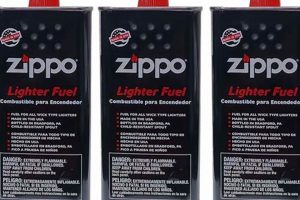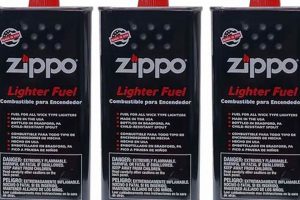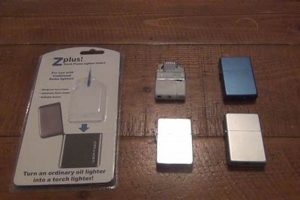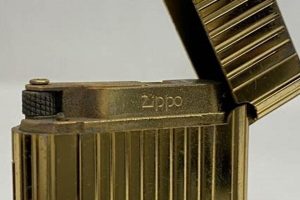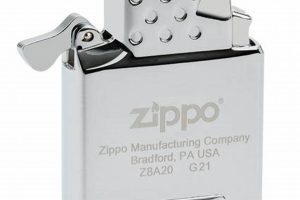Attempting to fill a butane lighter with Zippo fluid, also known as naphtha, is strongly discouraged and unsafe. Butane lighters are designed for pressurized butane gas, utilizing a specific valve system and burner optimized for its properties. Naphtha, a different type of fuel, has distinct chemical properties and a lower flash point than butane. Using naphtha in a butane lighter can lead to malfunction, leakage, fire hazards, and potential explosion.
Understanding the incompatibility of these fuels is crucial for safe lighter operation. Butane lighters are engineered for a specific fuel type to ensure controlled ignition and a consistent flame. Using the incorrect fuel can compromise this delicate balance, leading to unpredictable and dangerous outcomes. The practice carries significant risks and has no practical benefits, as each type of lighter is designed for its respective fuel for optimal performance and safety.
This critical safety information underscores the need for proper lighter usage. Topics such as identifying different lighter types, understanding their respective fuel requirements, and implementing safe lighter practices are explored further below. Recognizing the distinctions between fuel types is paramount to preventing accidents and ensuring responsible handling of these everyday tools.
Tips for Safe Lighter Fuel Usage
Safe lighter operation hinges on using the correct fuel. These tips emphasize the importance of proper fuel selection and handling to prevent accidents.
Tip 1: Identify the lighter type. Butane lighters typically have a transparent fuel reservoir and a fill valve. Zippo lighters have a removable insert and use a wick. Accurate identification is crucial for selecting the appropriate fuel.
Tip 2: Use only the specified fuel. Butane lighters require butane fuel. Zippo lighters require Zippo premium lighter fluid (naphtha). Never substitute one for the other.
Tip 3: Consult the manufacturer’s instructions. Refer to the lighter’s packaging or the manufacturer’s website for specific fuel recommendations and safety guidelines.
Tip 4: Store fuel safely. Keep lighter fuel away from heat sources, open flames, and children. Store in a cool, dry place.
Tip 5: Refill lighters in a well-ventilated area. Avoid inhaling butane or naphtha fumes during refilling.
Tip 6: Inspect the lighter for leaks. After refilling, check for leaks by smelling for gas or observing any fluid seepage.
Tip 7: Dispose of lighters responsibly. Follow local regulations for proper disposal of empty or damaged lighters.
Adhering to these guidelines promotes safe lighter usage and reduces the risk of accidents. Proper fuel selection and handling are paramount for maintaining functionality and ensuring personal safety.
The importance of safe lighter practices cannot be overstated. Further discussion on related safety measures and responsible lighter ownership follows.
1. Incompatible Fuels
Incompatible fuels represent a critical factor in understanding why Zippo fluid should not be used in a butane lighter. The core issue lies in the distinct chemical compositions and burning characteristics of butane and naphtha (Zippo fluid). Butane lighters are engineered for pressurized butane gas, with internal mechanisms calibrated for its specific vapor pressure, ignition temperature, and flame characteristics. Introducing naphtha, a liquid fuel with a lower flash point and different combustion properties, disrupts this delicate balance. This disruption can manifest as irregular flames, leakage, and potentially dangerous flare-ups.
Consider a real-world analogy: A diesel engine requires diesel fuel, while a gasoline engine requires gasoline. Attempting to use gasoline in a diesel engine, or vice versa, will lead to significant mechanical problems and potentially catastrophic engine failure. Similarly, using naphtha in a butane lighter introduces a substance the device is not designed to handle, creating a risk of malfunction and potential hazards. The practical significance of understanding fuel incompatibility is paramount for safe lighter operation. Using the correct fuel for the intended device isn’t simply a recommendation; it’s a fundamental safety precaution.
In summary, the incompatibility of naphtha and butane underscores the dangers of using Zippo fluid in a butane lighter. Attempting this substitution can lead to unpredictable and potentially hazardous outcomes. Understanding the distinct properties of each fuel and their respective intended applications is crucial for responsible and safe lighter usage. Ignoring these fundamental principles increases the risk of malfunction, fire, and personal injury.
2. Fire Hazard
The potential for fire hazard is significantly elevated when considering the use of Zippo fluid (naphtha) in a butane lighter. This stems from the inherent differences in the fuels’ properties and the lighter’s design. Understanding this connection is crucial for safe lighter handling and preventing accidents.
- Fuel Volatility
Naphtha is more volatile than butane, meaning it evaporates more readily at room temperature. This increased volatility raises the risk of flammable vapor accumulation around the lighter, increasing the likelihood of accidental ignition. A seemingly minor spark or even ambient heat could ignite these vapors, resulting in a sudden and potentially dangerous flame.
- Incompatible Ignition Mechanisms
Butane lighters utilize a specific mechanism designed for the controlled release and ignition of pressurized butane gas. Introducing naphtha, a liquid fuel, can disrupt this mechanism. Naphtha can leak from seals designed for pressurized gas, leading to uncontrolled fuel release and an increased risk of ignition. The lighter’s spark mechanism might also fail to ignite the naphtha properly, creating a dangerous buildup of flammable vapor.
- Unpredictable Combustion
Using naphtha in a butane lighter can result in unpredictable combustion. The lighter’s design regulates the butane flow for a consistent flame. Naphtha, being a different fuel, might not burn consistently within the confines of the lighters structure, leading to erratic flames, sputtering, and potential flare-ups. These unpredictable flames pose a significant fire hazard, particularly when dealing with flammable materials.
- Increased Risk of Explosion
The combination of increased volatility, incompatible ignition mechanisms, and unpredictable combustion drastically increases the risk of explosion when using naphtha in a butane lighter. If the lighter malfunctions due to the incorrect fuel, a buildup of flammable naphtha vapor within the lighter’s casing can create an explosive mixture. Any ignition source, however small, can then trigger a violent explosion, causing serious injury and property damage.
The fire hazards associated with using Zippo fluid in a butane lighter are substantial and cannot be overstated. The combination of fuel volatility, incompatible design, and unpredictable combustion creates a dangerous scenario with a high risk of fire and even explosion. Adhering to the manufacturer’s recommended fuel and understanding the inherent dangers of fuel substitution are essential for safe and responsible lighter use. Preventing accidents requires vigilance and a clear understanding of the fundamental principles of fire safety.
3. Malfunction Potential
Malfunction potential represents a significant risk when considering the use of Zippo fluid (naphtha) in a butane lighter. This risk stems from the fundamental incompatibility between the fuel and the lighter’s design. Butane lighters are engineered for pressurized butane gas, featuring specialized components optimized for its specific properties. These components include:
- Pressurized Fuel Reservoir: Designed to contain butane under pressure, enabling controlled release.
- Precise Valve System: Regulates the flow of butane gas for consistent flame height.
- Specialized Burner: Optimized for butane’s combustion properties, ensuring efficient and controlled ignition.
- Seals and Gaskets: Prevent gas leaks and maintain pressure within the lighter.
Introducing naphtha, a liquid fuel with different chemical properties and a lower flash point, disrupts the delicate balance within this system. Naphtha can:
- Degrade Seals: Naphtha can corrode or dissolve seals and gaskets designed for butane, leading to leaks and pressure loss.
- Clog the Valve System: The lighter’s valve system is calibrated for the viscosity of butane. Naphtha’s different viscosity can clog the valve, disrupting fuel flow and causing malfunctions.
- Damage the Burner: Naphtha’s combustion properties differ from butane. Burning naphtha in a burner designed for butane can produce soot, clog the burner orifice, and lead to inconsistent flames.
Consider the example of a precision instrument designed for a specific task. Introducing an incompatible substance can disrupt its function and potentially cause irreparable damage. Similarly, using naphtha in a butane lighter introduces a foreign substance into a precisely engineered system, increasing the likelihood of malfunction and jeopardizing its safe operation.
The practical significance of understanding malfunction potential is paramount for safe lighter usage. Recognizing the incompatibility between naphtha and butane lighters allows individuals to avoid potentially dangerous situations. Malfunctions can range from inconvenient (e.g., inconsistent flames) to hazardous (e.g., fuel leaks and fire). Taking preventative measures by using the correct fuel is a simple yet crucial step in ensuring safe and responsible lighter handling.
In summary, the potential for malfunction underscores the importance of using the correct fuel in a butane lighter. Introducing Zippo fluid (naphtha) can disrupt the lighter’s intricate mechanisms, leading to a range of malfunctions with varying degrees of severity. Prioritizing safety and responsible lighter use requires understanding the potential consequences of using incompatible fuels and adhering to manufacturer guidelines.
4. Designed for Butane
The phrase “designed for butane” encapsulates the core reason why using Zippo fluid (naphtha) in a butane lighter is unsafe and ill-advised. Butane lighters are precision instruments engineered specifically for pressurized butane gas. This specialized design encompasses every aspect of the lighter, from the fuel reservoir and valve system to the burner and ignition mechanism. Each component is carefully calibrated to function optimally with butane’s specific properties, including its vapor pressure, ignition temperature, and flame characteristics. This intricate design ensures controlled fuel release, consistent flame height, and safe ignition.
Introducing naphtha, a liquid fuel with different chemical properties and a lower flash point, disrupts this carefully engineered balance. The lighter’s components are not designed to handle naphtha’s unique characteristics. For example, the seals and gaskets within the lighter are formulated to resist butane’s chemical interactions but may be susceptible to degradation by naphtha. Similarly, the valve system is calibrated for butane’s viscosity, and naphtha’s different viscosity may cause clogging or malfunction. The burner, optimized for butane’s combustion properties, may produce excessive soot or inconsistent flames when using naphtha. Consider a high-performance engine designed for a specific fuel type. Using an incompatible fuel can lead to decreased performance, damage to internal components, and potentially catastrophic engine failure. The same principle applies to butane lighters: using the wrong fuel can compromise functionality and create safety hazards.
The practical significance of “designed for butane” lies in understanding that using the correct fuel is not merely a suggestion but a critical safety precaution. Ignoring this fundamental design principle can lead to malfunctions, fuel leaks, unpredictable flames, and an increased risk of fire or explosion. Safe and responsible lighter use necessitates respecting the manufacturer’s specifications and recognizing the potential dangers of using incompatible fuels. The seemingly simple act of using the correct fuel can prevent accidents and ensure the safe and intended operation of the lighter.
5. Risk of Explosion
The risk of explosion represents a severe hazard when considering the use of Zippo fluid (naphtha) in a butane lighter. This danger arises from the volatile nature of naphtha and its incompatibility with the butane lighter’s design. Butane lighters are engineered for pressurized butane gas, with safety mechanisms designed to contain and control the fuel. These mechanisms are not designed to handle naphtha, a liquid fuel with a significantly lower flash point and different combustion properties.
Introducing naphtha into a butane lighter can create a dangerous scenario in several ways. Naphtha can leak from seals not designed to contain liquid fuel, leading to vapor buildup in areas not intended for fuel storage. The lighter’s ignition mechanism, designed for butane, may not ignite the naphtha reliably, potentially causing a delayed or uncontrolled ignition. Additionally, naphtha’s lower flash point increases the risk of accidental ignition from ambient heat or sparks. If ignited within the confined space of the lighter’s casing, this volatile mixture can create a rapid pressure buildup, resulting in an explosion. The severity of such an explosion can range from minor damage to severe injury, depending on the amount of naphtha present and the proximity of flammable materials.
Real-world incidents underscore this danger. Reports exist of lighter explosions resulting from improper fuel usage, causing burns, property damage, and even fatalities. While these incidents may not always involve naphtha specifically, they highlight the inherent dangers of using incompatible fuels in pressurized devices. One can readily envision the potential consequences of introducing a highly volatile liquid like naphtha into a butane lighter designed for a controlled gas release. The potential for uncontrolled combustion and rapid pressure buildup within the lighter’s confined space creates a substantial risk of explosion. Understanding this risk is paramount for safe lighter handling. Choosing the correct fuel for the intended device is not merely a recommendation; it is a critical safety precaution that can prevent serious accidents.
6. Safety Paramount
The principle of “safety paramount” underscores the critical importance of understanding why using Zippo fluid (naphtha) in a butane lighter is dangerous and should be avoided. Lighter usage, while seemingly mundane, involves handling potentially hazardous materials and ignition sources. Prioritizing safety requires a thorough understanding of the risks involved and adherence to safe practices. Attempting to use an incompatible fuel like naphtha in a butane lighter demonstrates a disregard for this fundamental principle, increasing the risk of fire, explosion, and personal injury.
Real-world consequences can arise from neglecting lighter safety. Documented incidents of lighter explosions, often caused by improper fuel usage or tampering, highlight the potential for serious harm. These incidents can result in burns, property damage, and even fatalities. While not all such incidents involve naphtha specifically, they underscore the inherent dangers of mishandling lighters and using incorrect fuels. Consider the potential scenario of a naphtha-filled butane lighter malfunctioning near flammable materials. The consequences could be devastating. Prioritizing safety requires recognizing these potential hazards and taking preventative measures.
The practical significance of “safety paramount” lies in understanding that responsible lighter use extends beyond simply lighting a flame. It involves a commitment to safe handling practices, including using the correct fuel, storing lighters and fuel safely, and inspecting lighters for leaks or damage. Education plays a crucial role in promoting safe lighter usage. Understanding the reasons behind specific safety guidelines, such as why naphtha and butane are incompatible, empowers individuals to make informed decisions and avoid potentially dangerous situations. Ultimately, prioritizing safety transforms lighter usage from a potentially hazardous activity into a responsible and controlled one. This proactive approach minimizes risks and ensures the well-being of individuals and their surroundings.
Frequently Asked Questions
This FAQ section addresses common questions and misconceptions regarding the use of Zippo fluid (naphtha) in butane lighters.
Question 1: What is the primary reason against using Zippo fluid in a butane lighter?
Butane lighters are designed specifically for pressurized butane gas. Their internal mechanisms, including the fuel reservoir, valve system, and burner, are calibrated for butane’s unique properties. Using naphtha, a liquid fuel with different chemical properties and a lower flash point, disrupts this delicate balance and creates significant safety hazards.
Question 2: What are the potential dangers of using Zippo fluid in a butane lighter?
Potential dangers include fuel leaks, malfunctioning ignition systems, unpredictable flames, fire, and explosion. Naphtha can damage seals designed for butane, clog the valve system, and lead to erratic combustion within the lighter.
Question 3: Is there any situation where using Zippo fluid in a butane lighter is acceptable?
No. Using Zippo fluid in a butane lighter is never acceptable. It creates significant safety risks and can damage the lighter beyond repair. Always use the correct fuel for the intended device.
Question 4: What should one do if Zippo fluid is accidentally introduced into a butane lighter?
Immediately purge the lighter of any remaining naphtha and thoroughly clean it if possible. If unsure how to proceed safely, consult a professional or dispose of the lighter responsibly according to local regulations.
Question 5: Are all lighter fuels interchangeable?
No. Lighter fuels are not interchangeable. Different lighter types require specific fuel types. Always use the fuel recommended by the manufacturer. Using the incorrect fuel can lead to malfunctions and safety hazards.
Question 6: Where can one find reliable information about lighter safety and proper fuel usage?
Consult the lighter’s packaging, the manufacturer’s website, or reputable safety organizations for reliable information on lighter safety and proper fuel usage. Understanding and following these guidelines is crucial for preventing accidents.
These FAQs highlight the crucial distinction between butane and Zippo fluid and emphasize the importance of using the correct fuel for the intended device. Safe lighter usage requires a clear understanding of these principles.
The following section delves deeper into safe lighter handling practices and responsible lighter ownership.
Can You Put Zippo Fluid in a Butane Lighter? A Conclusive Answer
Exploration of the question “can you put Zippo fluid in a butane lighter” reveals a definitive answer: no. Butane lighters are engineered for pressurized butane, and introducing Zippo fluid (naphtha) creates substantial risks. Fuel incompatibility, fire hazards, malfunction potential, and the risk of explosion underscore the dangers of this practice. The lighter’s design, optimized for butane’s specific properties, cannot accommodate naphtha’s different chemical composition and lower flash point. Attempting to use these fuels interchangeably demonstrates a critical misunderstanding of lighter mechanics and fundamental safety principles.
Safe lighter usage requires a commitment to informed practices. Understanding the distinct properties of different fuels and adhering to manufacturer guidelines are paramount. Responsible lighter handling safeguards not only personal well-being but also the safety of surrounding environments. The potential consequences of misusing lighters underscore the vital importance of prioritizing safety and informed decision-making. Promoting awareness of these principles contributes to a safer environment for all.


